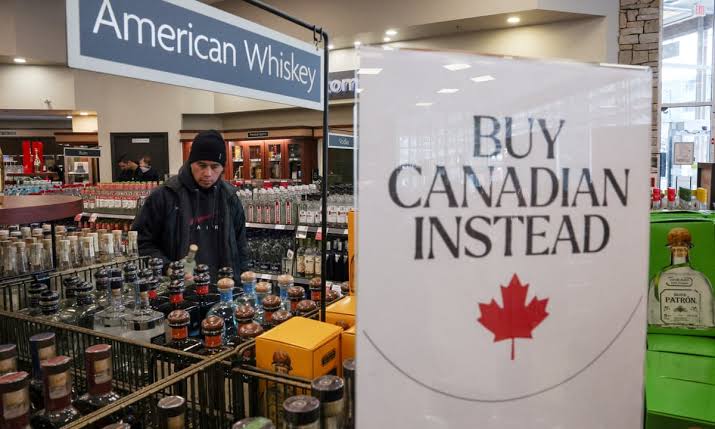
Frustrated with funding American imperialism? Take a stand,” states the description of a Facebook group initiated in France that urges its members to bolster the French and European economies by avoiding products manufactured in the United States.
The group, titled Boycott USA: Buy French and European!, was established on February 28 and has quickly gained over 20,000 followers who exchange advice on substituting popular American brands like McDonald’s, Levi’s, and WhatsApp with local alternatives.
Similar grassroots initiatives are emerging across northern Europe. Two Swedish Facebook groups each boast around 80,000 members, as does a Danish group, while smaller communities are forming in the Netherlands and Belgium.
“It’s not merely about boycotting everything indiscriminately; it’s about intentionally directing our spending towards options that best support the local French and European economy,” wrote Édouard Roussez, the founder of the French group, in a post.
Members of the group compile extensive lists of American brands to avoid, although identifying what qualifies as “American” can be complex in a globalized economy. For instance, Coca-Cola operates a significant factory in northern France. Would a boycott negatively impact French workers?
Roussez emphasizes that the purpose of the Facebook group is to engage in discussions about such dilemmas. He recommends prioritizing the avoidance of specific US brands like Amazon and Tesla, which have financially supported Trump’s presidential campaign.
European Purchasing
There are indications that these boycotts may be beginning to make a difference.
In France, the instant messaging app Treebal, based in Brittany, has seen a daily increase of 200 new users since Trump took office. The app attributes its growth to users moving away from US-based platforms like X and WhatsApp, whose CEOs have shown support for the US president.
In Denmark, opposition to the Trump administration has intensified, particularly due to his repeated threats to assert control over Greenland, an autonomous territory within the kingdom.
Anders Hagh, the CEO of Denmark’s leading grocery retailer, the Salling Group, announced in late February that their supermarkets will implement a new electronic tagging system to identify European products with a black star. This initiative aims to address numerous customer requests for groceries from European brands.
One of the most significant effects of the European boycotts has been observed with Tesla, the automotive and energy company led by Elon Musk, a close ally of former President Trump. Tesla’s sales of electric vehicles in Europe have plummeted by 50 percent compared to the previous year.
The company has also faced a notable decline in sales in Canada, where a boycott of U.S. products, supported by former Prime Minister Justin Trudeau, is actively taking place.
Rising Prices
Could these European boycotts genuinely harm the U.S. economy?
According to Alan Bradshaw, a marketing professor at Royal Holloway, University of London, “Typically, the effects of a boycott are more likely to impact corporations rather than the broader economy; consumers may choose a different car brand instead of opting out of purchasing a car altogether.”
Thus, while U.S. brands like Tesla may experience setbacks, the overall economy is unlikely to be significantly affected, partly due to the limited scale of these boycotts.
Although online groups may have garnered tens of thousands of members, “there are hundreds of millions of people living in Europe, many of whom are indifferent to the origin of products,” notes Meredith A. Crowley, an economics professor at the University of Cambridge.
Nonetheless, one potential consequence of targeted boycotts could be an increase in prices for consumers, including those participating in the boycotts. Crowley explains, “European domestic brands, facing less competition from American companies, may have the leverage to raise their prices.”
Bradshaw adds, “The most probable effect for consumers will stem from changes in supply chains, particularly with rising raw material costs.”
We may observe that certain popular products, which we typically do not link to America, could see price increases or even vanish from our store shelves.
Tariff Conflicts
Consumers in Europe are likely to experience rising prices due to the $28 billion in tariffs imposed by the EU in retaliation for the 25 percent tariffs on steel and aluminum imports from the US, which took effect on Wednesday.
Ursula von der Leyen, the head of the European Commission, expressed in a statement that the EU “deeply regretted” the implementation of these tariffs, noting that they are detrimental to businesses and even more harmful to consumers.
See More: French finance minister calls Trump’s trade war ‘idiotic’, plans US trip
However, Crowley argues that matching the US tariffs, as Canada and China have done, “may be the only way to compel the US to engage in negotiations,” especially with a leader like Trump, who prefers a confrontational and spontaneous approach over the established multilateral trading system that typically guides trade relations.
In retaliation to the EU’s tariffs, the US president announced on Thursday his intention to impose a 200 percent tariff on wine and alcoholic beverages unless the EU removes its tariff on American whisky.
“This only strengthens the case for boycotting products made in the USA,” commented one French individual advocating for the boycott.
For many, the decision to reject US goods serves as a form of protest against Trump’s policies rather than against the United States as a whole.
“I visit the United States once or twice a year, but I have canceled my trips planned for May and October,” shared another traveler. “I plan to return in a few years. This year, I intend to visit Canada instead.”



